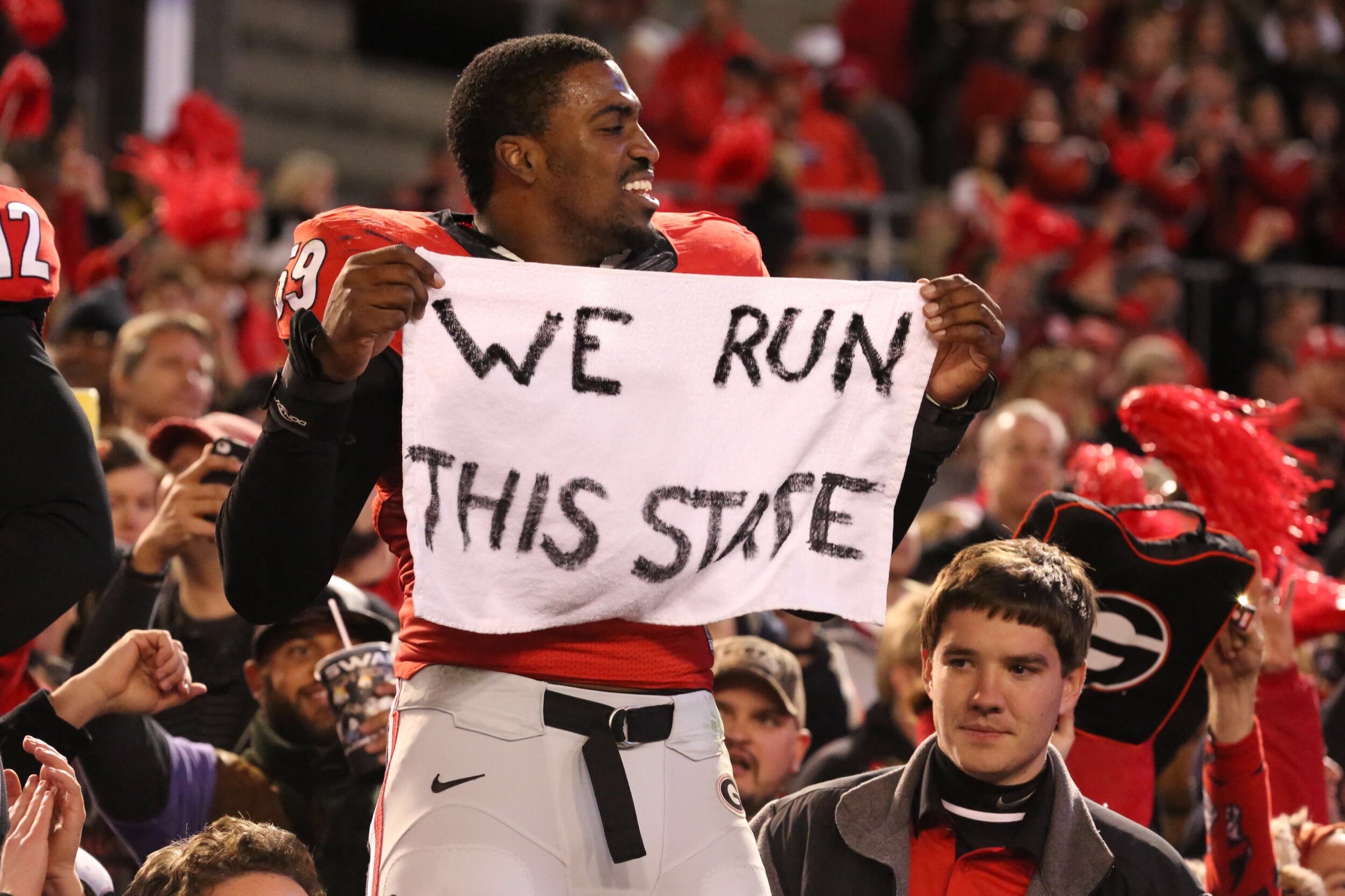(Photo Used With Permission)
It seems a bit too early in college football’s talking season to get this deep into such a fundamental debate, but recent events have forced my hand!
Yep. That’s right. I had no choice but to respond. There was no way I could sit on my hands and let this tragedy befall our beloved sport without offering my sincerest opinions on the matter. It was entirely unavoidable.
Starting with the 2024-25 college football season, the sport’s ultimate title will be decided with a 12-team playoff. For now.
(Shouldn’t it be a red flag that we’re already doing away with the new system before playing a single season under it?)
Expansion is utterly inevitable, I fear, as the creeping bloat of tournaments in recent years has come to show. Every professional league is adding more and more playoff spots, including the NBA where half the teams already make the playoffs at the end of the season.
Before we get into the crux of the argument, let’s set aside any illusions we might have. The real reason these championships are expanding is because it provides an added opportunity for the stakeholders to increase the size of their steaks. Or something.
The 2023 NFL playoffs averaged 38.5 million viewers per game in the leadup to the Super Bowl, and then had a staggering 120.4 million viewers for the famously unnamable event.
The most recent NBA playoffs, concluding in June 2023, piled up more than 5.4 million viewers per game. While those numbers may seem tame in comparison to the astronomical number of people watching the NFL playoffs, those numbers represent a five-year high for the Association. It’s also worth remembering that the NBA features seven-game series at (almost) every level of their postseason.
Because we really need seven games to watch a team with a losing record after 81 games get boat raced by probably one of the best basketball teams in the world.
Getting back to the matter at hand, the seven games that made up the 2023-24 College Football Playoff and the New Years Six drew approximately 15.1 million viewers per game, with a total of about 25 million for the National Championship Game alone.
If you’re pulling numbers like these, why wouldn’t you want to have even more games? Why not give yourself a few extra chances to sell those ads?
Sports are big business, and thus all the decisions being made have to follow what’s best for business.
In the short term, this approach may work. You may see television deals worth millions (billions) of dollars bringing heretofore unseen revenue into the coffers of the league offices. And the fat cats will keep getting fatter and meowing even louder.
But that doesn’t mean that these decisions are always best for the long-term health of the product…er…the sport.
I failed to mention the World Series above, and there’s a good reason for that.
Okay, so the reason is that I just skipped baseball because I only wanted three examples, but it fits the narrative now, so here we go.
Major League Baseball has been struggling to keep its viewership over the last few years, amid cheating scandals and Covid seasons and the apparently terrible attention span of those blasted Gen-Zers.
“We have a TV, but…we’re actually Mariners fans.” (Photo by Vivian Arcidiacono on Unsplash)
The 2023 World Series, which happened to be won by the “small market upstart” Texas Rangers, represented the fifth straight year of declining World Series viewership with just under 10 million viewers on average.
Executives blame the small-market teams in the Fall Classic, because everyone knows that Texans both hate baseball and that the 30 million people who live there don’t have TV.
Or it could be that the new playoff format punishes high-achieving teams and dilutes the playoff field right off the bat - pun not intended. Who wants to watch that?
The same thing tends to be true with March Madness after the first weekend. People love to see the Cinderella upsets early on, but then after a while, they prefer to see the best teams competing for the championship.
(Full disclosure, March Madness is one of those areas where the data “suggests” something without showing it conclusively. The numbers year-to-year aren’t enormously different in most cases, but there is certainly a trend.)
But maybe it doesn’t matter, right? Maybe it’ll all be fine because, after all, there will be even more meaningful games late in the college football season, right?
When there were just two teams that could play for the national championship at the end of the year, I guess the only games that mattered were the ones those teams played in. Or perhaps if a favorite lost late in the year, then that game mattered because it narrowed the field.
So basically, you had to be an undefeated team from a top-tier conference in order for your games to matter. Because undefeated teams from top-tier conferences are bulletproof.
That means that 99% of the college football games ever played have been utterly meaningless. Sorry. That’s the rule.
By that measure, USC’s 42-10 lopsided win at BYU on Sep. 18, 2004 means infinitely more than Tennessee’s riveting 30-28 victory over 11th-ranked Florida on the same day because USC won the national championship and neither Tennessee nor Florida were really in the running by the end of the season. Sorry, Vols. I don’t make the rules. I just lampoon them in very specific ways that prove my point.
Once the field expanded to four participants, however, the playoff meant more games were meaningful! Heck. There could be as many as eight teams in the hunt for the championship going into the final weekend of the season, right? That’s good television!
You know something? I take umbrage with this notion for many, many reasons.
For starters, every game matters. It matters to the fans. It matters to the players. It matters to the alumni who stake their personal pride and emotional well-being on the outcome of a contest between the world’s most freakishly athletic teenagers and young adults.
The games all matter. To claim otherwise is to devalue the sport you claim to love.
I think about all of the “meaningless” games I’ve been to over the years and I loved every single one of them. There’s no denying that Georgia is on top of the world in college football right now, no matter what those Michiga-losers would have you believe. And these games with playoff implications are exciting.
But I have also lived and died by Georgia football for more than two decades, and we were “out of the hunt” halfway through many of those seasons.
I think about the annual rivalry game against Tech. Are you telling me that nearly all of those hundred some odd contests were entirely in vain?
I will use this photo from the 2013 double-OT win over Tech every single time I get a chance to. (Photo by Larry Wynn)
The 2010 edition of “Clean, Old-Fashioned Hate” was messy and sloppy and full of ugly football. And you know what? Sending Tech home with a loss in that game was just as satisfying at 6-6 as it was in 2022 to go 12-0.
So it bothers me when people say that those games are “meaningless” because every snap of college football is dripping in tradition and meaning.
There are precious few games that I would really call “meaningless” in the history of college football. One of the easiest choices for a truly meaningless game is the 2017 Iron Bowl where Auburn defeated the top-ranked CFP team for the second time in the same season, upending Alabama 26-14.
That victory gave Auburn a spot in the SEC Championship with a potential CFP berth on the line if they could just beat Georgia for a second time in the same season.
Unfortunately, they could not. Both Georgia and Alabama would make the CFP that season and would ultimately meet in the Championship Game.
I can’t recall the outcome of that one, for some reason. Oh well. I’m sure it isn’t important. Probably just another meaningless game.
Before the CFP, Bama’s loss in the Iron Bowl would have gone down as one of the most crushing defeats in that series’ history. A previously undefeated Crimson Tide would have missed out on the conference championship game and any chance at the National Championship, and Auburn could have gloated about that forever.
Instead, the loss might have actually helped Bama, giving them a backdoor into the CFP and one less game to worry about wear and tear. And what can Auburn really gloat about when their archrival still won the title that season? (Oh. Right. That’s what happened.)
That is the definition of a meaningless game, where a loss didn’t matter at all. And it was only possible because of a playoff.
That’s not to say these kinds of allegedly meaningless games never happened before. Oklahoma once lost their conference championship game 35-7 against Kansas State and still went on to play in the BCS National Championship Game against LSU.
With a 12-team playoff starting soon, and the inevitable bloat of further expansion, you’re only going to see even more games where the outcome just doesn’t matter for one or more teams.
How do you feel about an undefeated Georgia resting starters in a rivalry game against Georgia Tech, knowing that a loss “doesn’t matter” when winning the SEC Championship Game would likely provide a first-round bye either way?
You may not be a Georgia fan, but let’s not pretend that we are the only program that could possibly see such an event in our near future.
We’ve been seeing this sort of thing going on in the NFL and other leagues for years. A team might have already locked down the first-round bye and will rest most of their starters. The game might matter if the opponent is on the verge of a playoff spot or could pick up a better seed, but there’s a very real chance that the game will have no bearing on the playoff picture.
And this kind of thing happens just about every season.
PICTURED: A royalty-free image of a man who’s final regular-season football game was a very meaningful loss to the Atlanta Falcons. (Photo by Cian Leach on Unsplash)
With an ever expanding playoff in college football, it is only a matter of time before we see this exact brand of “meaningless” game in a sport that once required excellence week in and week out.
We’ve already seen the SEC play around with decades-old schedules and rivalries in order to maximize entertainment value with late-season division games. On Georgia’s schedule, Tennessee replaced Auburn as the next-to-last SEC game of the year. Georgia and Auburn have been playing that same spot on the calendar for almost as long as the “Deep South’s Oldest Rivalry” has been in existence, but the SEC wanted a division game at the end to spice things up.
It worked like a charm in 2022, with the first ever #1 vs. #1 game going Georgia’s way in Sanford Stadium, but an expanded playoff would potentially make the move…say it with me…meaningless.
While conference games are less likely to suffer from the same fate, it is still entirely possible that a late-November SEC game will happen after one team or another has already locked up their spot in the conference title game. And with the end of divisions, it is even more likely that a late-November SEC game will have no bearing on who plays in the conference championship.
For years, people have been arguing that we need a playoff to save the sport of college football from an onslaught of meaningless games. All we’re doing is creating a miniaturized version of the NFL with four times as many teams.
College football has always thrived on being a wholly different product with more passionate fanbases, deeper regional ties, and an entirely different type of season than the NFL. What’s going to happen when the casual fan sees that the college game is no longer a separate thing from the NFL and decides to just watch the pros play?
The chase for the almighty dollar will, more often than not, lead to irreparable harm.
And what’s more, the higher the dollars, the tighter the margins. It won’t take much for the whole house of cards to come crashing down. The first hint of downturn in the sport’s popularity could spell doom for the broadcasters and everyone else who stands to lose from college football’s cash cow status.
Maybe college football’s collapse will happen quickly enough that we can actually save it.
NOTE: The photo of Javon Bullard is from one of my media contacts. I know it sounds made up, but I have been told I can use their photos so long as I don’t credit them or their media outlet. I know. Just trust me.







